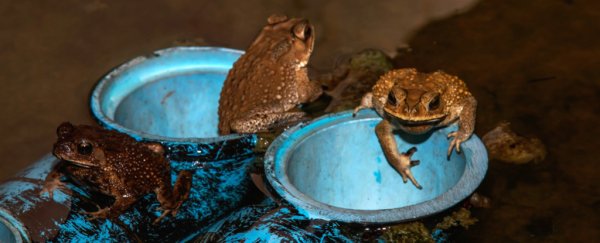A 4,000-year-old tomb in Jerusalem has yielded up a lovely surprise - a funerary vessel containing the tiny bones of at least nine toads, all of which had been decapitated prior to being placed inside.
The tomb was one of 67 human-made shaft tombs found in the Nahal Repha'im basin, not far from the Jerusalem Biblical Zoo. The area was populous during the Canaanite period, and archaeologists have uncovered two settlement sites, two temples and a number of cemeteries in the region.
It dates to the Middle Bronze Age, and while funerary jars containing offerings of food to provide sustenance to the dead are common, finding toads inside is not.
"To the best of my knowledge, the only other place in Israel with a toad find was in Wadi Ara, and dates to the Late Bronze Age," dig co-director Shua Kisilevitz of the Israel Antiquities Authority told The Times of Israel.
 The jar of toad bones. Zohar Turgeman-Yaffe, Israel Antiquities Authority
The jar of toad bones. Zohar Turgeman-Yaffe, Israel Antiquities Authority
The tomb had been intentionally sealed with a large rock. Inside was a single, poorly preserved human skeleton, surrounded by intact bowls and jars.
"For an archaeologist, finding tombs that were intentionally sealed in antiquity is a priceless treasure, because they are a time capsule that allows us to encounter objects almost just as they were originally left," said Kisilevitz and dig co-director Zohar Turgeman-Yaffe.
Other tombs have revealed a variety of foodstuffs such as goat, oxen and gazelle left behind for the dead, as well as lamps, amulets such as scarabs, and toggle pins, the latter probably to secure the burial garment.
The find indicates that toads were part of the local diet during the time of the burial.
"We understand that this was part of the food consumed while still alive," Kisilevitz said. This would explain why the heads were missing - they would have been taken off so that the skin could be removed in preparation for eating.
The team will present their research on 18 October 2017 at the New Studies in the Archaeology of Jerusalem and its Region conference at the Hebrew University of Jerusalem.
